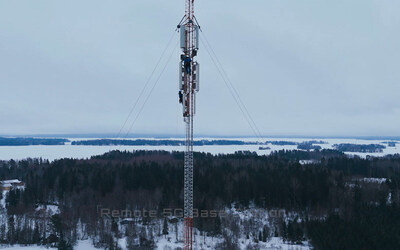DÜSSELDORF, Germany, Sept. 26, 2024 /PRNewswire/ -- Digital technologies are helping humans to live in better harmony with Nature, from tackling the impact of climate change to delivering high-speed broadband to remote communities, the latest episode of Discovery's "Being Digi-Sapiens" shows. Episode Three, "Connecting with Nature," follows the Swedish inventor, roboticist, and YouTuber Simone Giertz as she travels across Europe.
Finland: high-quality broadband in a land of forests and lakes
Providing high-quality Internet access to sparsely populated areas can be a huge challenge. Optical fiber, the gold standard in fast home networks, tends to be too expensive to deploy in more remote locations. This unequal broadband access separating large cities and rural areas creates a form of "digital divide" and a policy headache.

When she travels to rural Finland, Simone discovers that Huawei is upgrading 4G equipment to 5G. Unlike 2G, 3G, or 4G, 5G works in multiple frequencies, including the sub-gigahertz range. One of the 5G frequencies used in Finland, 700Mhz, enables antenna towers to provide a signal over vast areas. Rural homes equipped with a CPE (customer premise equipment, also called 5G routers) convert the 5G signal to get quality Wi-Fi strong enough to simultaneously support cloud gaming, video calling, and the other applications used by typical families. With 5G, Finland is out of the woods when it comes to rural broadband.
With one of the best 5G coverage rates in Europe, Finland is a poster boy for the benefits of digitalization. Recent achievements include operator DNA's successful 10 Gbit mobile network speed test, local operator Lounea's commercial launch of 50G PON, as well as operator Elisa's virtual battery solution, where base station backup batteries are used to balance the electric grid.
Athens, Greece: Technologies that warn of extreme weather and protect forests
Extreme weather events are becoming more common. In Greece, more frequent heat waves are increasing the threat that forest fires burn out of control. But when the Digi-Sapiens host travels to Athens, she learns about two technologies that help mitigate the harmful effects of weather extremes.
Earlier prediction of potentially dangerous weather events gives people time to get ready before disaster strikes. A Huawei AI called Pangu Weather has proven adept at predicting extreme weather events. "We made a hybrid system that integrates the advantages of AI and conventional methods," Dr. Lingxi Xie, a Huawei senior researcher who worked on the development of Pangu Weather, tells Simone. "Pangu's AI algorithms will better predict extreme weather events," Xie adds.
Although being warned of a heat wave is helpful, it's not by itself enough to protect Greek forests from catching on fire. At Syggrou Estate, a forested public space near Athens, Huawei has worked with partners to deploy an AI solution to detect fires at a very early stage, before they start burning out of control. Over 500 sensors monitor the estate day and night for smoke, air particles, dryness, or abnormal temperatures.
Giertz gets the chance at Syggrou to test out an upgraded version of this fire detection system. Developed with partners National and Kapodistrian University of Athens (NKUA) and the start-up PROBOTEK under the TECH4ALL project, it not only detects fires but also provides fire spread analysis, evacuation planning, and route planning for first responders. It can also estimate how many people in the area will be affected by the fire, and send personalized notifications via an app to residents' phones, suggesting evacuation routes based on the municipality's civil protection plans.
Photo - 
CONTACT: Ruoshan Cheng, chengruoshan@huawei.com